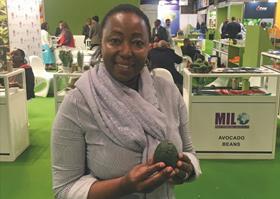
On Karakuta Farm in Juja, Kiambu County, just north of the Kenyan capital of Nairobi, avocados have been identified as a potential contributor to much-needed female empowerment in the country. With assistance from the SheTrades Commonwealth programme, which aims to increase economic growth and job creation in Commonwealth countries by increasing the participation of women-owned businesses in international trade, Karakuta Farm has the goal of transforming women’s lives in the local community and paving the way for others across Kenya to do the same.
The project is funded by the UK Department for International Development and implemented by the International Trade Centre under the framework of the SheTrades Initiative. The ambition is to connect 3m women to the market by 2021 and rally stakeholders around the world to work together to address trade barriers and create greater opportunities for female entrepreneurs.
Karakuta CEO Grace Ngungi is excited by the potential of avocados to drastically improve lives in her community. “Karakuta was initially a huge coffee plantation of over 400ha,” she says. “Half is still coffee, but the rest we are pulling down and replacing with Hass and Fuerte avocados. So far we have done 16ha.”
According to Ngungi, coffee does not provide the return on investment that farmers in the area require due to the running costs associated with coffee production. “We have a lot of land, water and a good climate, so we thought we could create a great social community around avocados,” she says. “We built a nursery, and any women who work with us get seedlings and technical support free of charge.”
Ngungi talks about the need to address multiple social issues affecting the country, with alcohol and domestic abuse both major problems. “Young people are increasingly being radicalised,” she says. “The women are often burdened with meeting the needs of their household without any source of income. We realised that the women needed a sustainable income for themselves. We have taught them how to graft high-breed avocado varieties, how to grow and how to harvest, including when you use pesticides and how you prune to achieve the best yields.”
Karakuta’s plan next season is to complete its packhouse in order to be able to buy back the avocados from the women for overseas markets. “Providing the women with a structured and secure market will address issues that have been a challenge for farmers and affected the industry,” says Ngungi. “First, the farmer is assured of better prices on the market than those offered by brokers. Second, since the farm provides the farmers with an advance credit facility, the fruits are only sold when they are mature and not out of desperation. Last, thanks to these measures, avocados from the Juja region will bear an international brand. We sell through exporters, but this year we will export ourselves. We send to Denmark and Dubai, as well as some volumes to the Netherlands. We also do herbs, which we export directly to the same markets. Avocados are seasonal, running from February to October, so in between the seasons you need other products to be able to provide employment. Herbs are a weekly item that we send to the UK, Denmark and the Netherlands.”
Next year, according to Ngungi, the company will have a good crop of avocados for export for the first time – approximately 63 containers – and she is convinced that Juja can become as renowned for avocados as nearby Muranga. “At the moment, people talk about Muranga because Kakuzi [major Kenyan avocado producer-exporter] is there,” she says. “But our area can become like that. Growers around Kakuzi up their game because they know they have the export infrastructure they can rely on. That is what we need.”
In Kenya, brokers tend to buy avocados at low prices often before the crop is actually ready. “This system raises big challenges in terms of quality control,” she adds. “The government is educating farmers not to sell to brokers at certain times, enforcing a ban before the season officially starts. That’s what makes Kakuzi different. They are in charge of the whole system – growing, harvesting, packing and exporting – and that’s what we want to do.”
For this effort, knowledge and cooperation will be everything. “Knowledge is power,” states Ngungi. “Information is so important. Initially we didn’t know how to plant avocados. They don’t like a lot of water so you plant them in raised beds. A company like Kakuzi could provide more technical support like this, giving access to farmer groups to visit the nursery and learn planting techniques. They conduct seminars, but serious farmers want field-based training, and that’s what we do for our women.”
Karakuta links its growers to other support services that play a critical role in the region in combatting HIV, offering microfinance loans and improving nutrition. “We are trying to structure our growers so they can deal with all sorts of challenges, the things that come with poverty, like a lack of information and self-confidence,” she says. “Women are social animals who learn through groups. We have seen a lot of positive change from such efforts. The important thing to remember is that my community is my friend. We grow together.”



